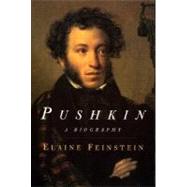Impudent genius, libertine, wounded son, jealous husband, victim of snobbery and censorship--Pushkin was all of these. But above all he was a brilliant author whose vision, invention, and vitality continue to thrive in literature today. Feinstein, herself a distinguished poet and novelist, has seamlessly intertwined the subject and the biographer, capturing for the reader the essence of one of the most intriguing men ever to enter the pantheon of literary geniuses.








